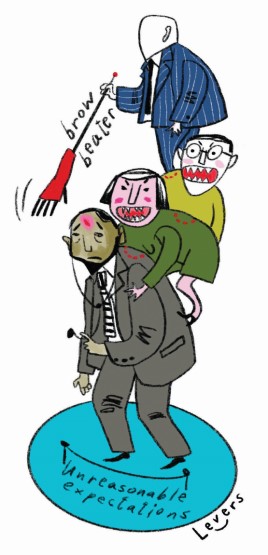If we want great leaders, we must stop rewarding the wrong behaviours
The NHS needs top-class leaders, but our approach to performance management and promotion filters out good managers in favour of brow-beaters and manipulators.

Great leadership is central to great patient care, but in today’s NHS effective managers are as scarce as resources—and that’s because the incentives actively promote poor practice.
I’ve worked for NHS commissioners and providers for 30 years, culminating as a departmental head. Of my ten line managers, just two were role models: smart people who knew leadership was about supporting and motivating staff, not browbeating or manipulating them. Only these two had my full respect and made me want to be more like them.
Authenticity, accountability and humility really matter. If staff see leaders with these qualities, they want to help them succeed. But if they view managers as self-interested, treacherous and unaccountable, they’d rather see them fail. Ultimately, every organisation’s success rests on the commitment, enthusiasm and support of its workforce.
What’s more, when leaders show the wrong behaviours, the effects reach well past the organisation. We’re not just members of staff; we’re spouses, siblings, parents, sons and daughters. And if stress at work seeps into the home, people’s morale falls further—feeding back to affect their working lives.
Poor leadership is not unique to the NHS; but too often, NHS recruitment systems and incentives for managers encourage all the wrong behaviours. People are promoted because they hit delivery targets like the four-hour A&E waiting time—yet that’s no measure of their skills in strategic leadership, building a positive organisational culture or motivating staff. Behind positive performance metrics, it’s common to see high levels of staff turnover, sickness absence, internal strife and disciplinaries. Selection processes focus on ticking boxes about qualifications and experience. There’s little attempt to focus on character, weeding out the narcissists, sociopaths, micromanagers and bullies.
Too many leaders seek personal advantage by setting colleagues against one another, monopolising credit for successes, and shifting blame for mistakes onto more junior staff—with the result that people stop being honest about their errors, or experimenting with new working methods. Sadly, this approach carries these individuals to the top—where they perpetuate this unsafe back-biting culture, setting an example which cascades down the organisation. What incentive do managers have to change their behaviours, when bullying is rewarded rather than challenged?
Values-based behaviour systems are created, at great expense. Yet leaders seem to forget that their behaviour is under constant scrutiny—and when their actions cut across those values, staff sniff out the fakery and lose trust in the system. Then these frameworks deteriorate into tick-box exercises, rather than thriving systems helping to grow and challenge behaviours. There are vital lessons here for the development of the new COMPACT agreements.
Occasionally, a great leader does make their way up through the system; and they’re easy to spot. They are willing to take flak to protect staff, and assume responsibility for things that go wrong. They trust people, giving effective staff autonomy in their work, and offering those who are struggling private support—not public humiliation. They are confident enough to welcome constructive challenge, rather than seeing it as a threat. They are humble enough to understand that they can learn as much from their staff as their staff can from them. And they get better results: their teams aren’t just happier, but also more likely to hit their clinical targets.
To identify and promote these people, we must change the NHS’s approach to recruitment and performance management. Professional skills can be taught more easily than character attributes. So rather than simply judging people against performance targets, we should promote candidates based on their characters, then provide the support and training they’ll need to thrive in the role.
Character is hard to measure, but we can track its effects: there are plenty of clues to individuals’ leadership styles, and we should make better use of them. Alongside performance metrics, we should be examining staff attrition rates, sickness and disciplinaries within a manager’s teams, and pulling in staff engagement figures from the staff survey. And we should recognise and promote the value of exit interviews—which are often too honest for comfort, and end up buried deep in HR files.
NHS staff want to serve the public, support their colleagues and strengthen our health services. With the right leadership, organisations can become brilliant places to work, drawing on people’s skills and commitment to deliver amazing care. But as Simon Sinek wrote in Leaders Eat Last, in a weak culture we veer away from doing “the right thing” in favour of “doing the thing that’s right for me”.
Changing the way the NHS identifies, promotes and supports the next generation of leaders is not an easy task. Yet if we don’t do so, we will never tackle this deep-rooted problem—and in a sick culture, it’s very hard to make people healthy.
The Sharp End is your chance to tell politicians and civil servants how their policies affect you. To work with a reporter on your own story, email editor@healthcare-manager.co.uk. When requested, anonymity is guaranteed.
Related News
-

NHS job cuts: you’ll never walk alone
As the NHS redundancies in England loom, Rhys McKenzie explains how MiP will back you, and how members supporting each other and acting collectively is the best way to navigate this difficult process.
-

What now? Seven expert takes on the Ten-Year Plan
The government’s Ten-Year Plan for the NHS in England has met with enthusiasm and exasperation in equal measure. We asked seven healthcare experts to give us their considered view on one aspect that interests, excites or annoys them.
-

NHS job cuts: what are your options?
When politicians start reforming the NHS, there is only one certainty: some people will lose their jobs. But what options might be on the table and how does redundancy work? Corrado Valle explains.